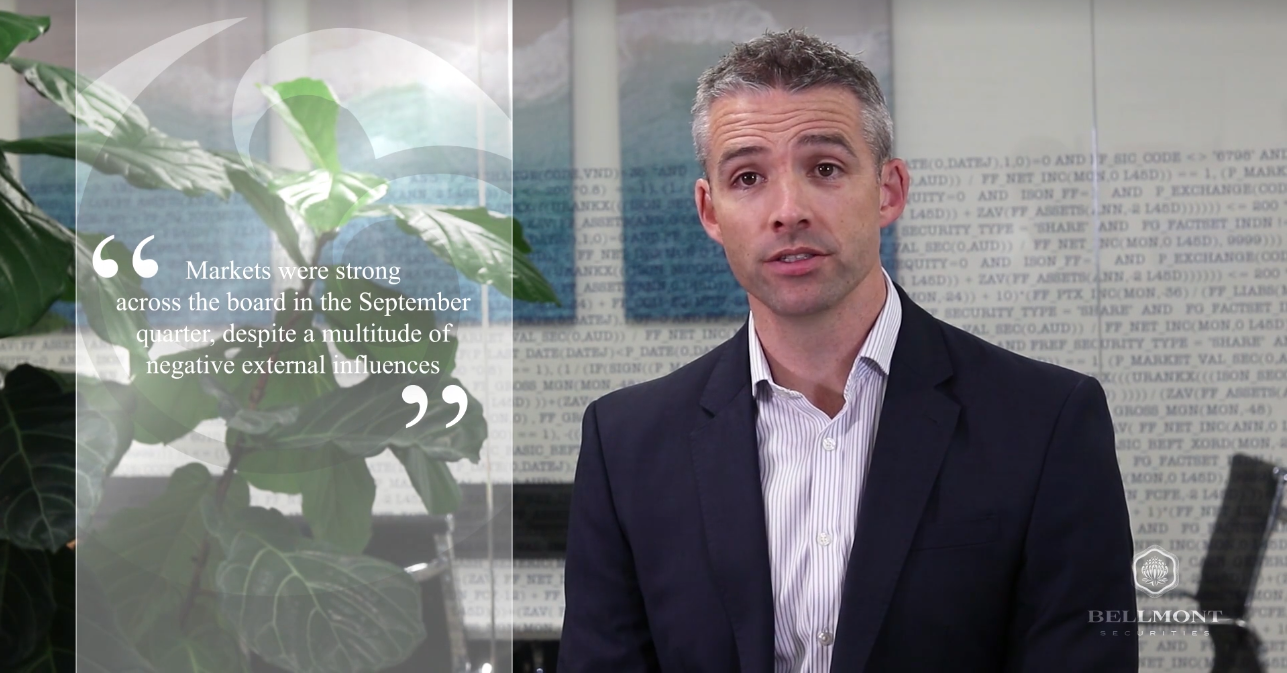The Bellmont Consolidated Equities Portfolio is a cost-effective, diversified and transparent portfolio of approximately 25 high quality Australian companies, drawn from the 300 largest companies on the Australian Stock Exchange (ASX).
The portfolio’s strategy is to identify and invest in a diversified portfolio of reasonably priced, high quality businesses, utilising a combination of quantitative / systematic and traditional fundamental analysis. The portfolio’s holdings will tend to exhibit high and stable returns on equity and capital, a conservatively geared balance sheet, a history of stable, growing earnings and cashflows, and a capable, aligned management team.
The portfolio’s ‘value’ bias sees the portfolio managers attempt to purchase these high quality businesses when they are trading at reasonable multiples of their earnings and cashflows, often when they are out of favour with the rest of the market.
‘Core’ - Approximately 15 companies selected from the 100 largest companies on the ASX, filtered through a rigorous multi-step systematic process designed to screen out firms showing early signs of distress and identify the highest quality value stocks on the market. This component of the portfolio is rebalanced on a regular basis to ensure the optimal mix of quality and value and make adjustments for changing fundamentals. Intelligent exposure to Australia's largest listed businesses.
‘Satellite’ - Approximately 8 to 12 high quality, founder-led companies selected from the 300 largest companies on the ASX. This section of the portfolio aims to identify and invest in outstanding businesses, run by quality (usually founder-led) management teams, where we can be virtually certain that earnings will be materially higher in five and ten years time. Intended holding periods of 5 years plus leads to low turnover in this side of the portfolio.
Where does the Consolidated Equities Portfolio Fit?
The overall portfolio is designed to provide a cornerstone Australian Equities holding, providing cost-effective exposure to a carefully curated selection of large and mid-cap Australian companies, but without the excessive sector concentration that can be prevalent when investing in the ASX200. Beneficial ownership of the underlying shares improves tax-efficiency for clients, while the portfolio's transparency and comprehensive communications program combine to provide a truly premium client experience.
Investment Philosphy
The overarching investment philosophy for the Bellmont Consolidated Equities Portfolio is a combination of ‘Quality’ and ‘Value’ - that we refer to collectively as ‘Quality at a reasonable price’.
The market inefficiencies that we seek to exploit through this portfolio are the ‘value effect’ (which we describe in more detail below), the ‘Quality’ factor (also described in more detail below), as well as ‘recency bias’ - the tendency for investors to more prominently recall and emphasise recent events, than those in the near or distant past. This can cause investors to extrapolate any short term difficulties a firm is experiencing out into the future, and underprice the shares relative to their long term prospects.
We believe that our performance track record provides ample evidence to support our investment approach (see performance below). Academic research further validates our empirical findings, with extensive academic research conducted into the factors and strategies that underpin our portfolios (see citations below).
Our Beliefs
Investors are not perfectly rational, which means markets are not perfectly efficient. We believe that disciplined investors can outperform over time, by acting independently of the 'herd', and buying quality businesses when they're out of favour with the rest of the market.
Never underestimate the power of incentives. By ensuring strong alignment of interests between ourselves, our clients and the management teams of the businesses in our portfolio, we significantly improve the likelihood of long term success.
Markets fluctuate on a daily basis, but quality businesses, with growing earnings will move steadily higher over time. We seek to shut out the ‘noise’ of short-term market fluctuations, and focus on the long term trajectory of earnings of the high quality businesses we own.
















